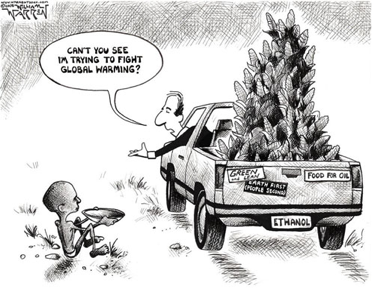Local ethanol could power cars this year
Posted By Stabroek staff On January 20, 2013 @ 5:22 am In Local News | No Comments
The Agriculture Ministry and the Guyana Energy Agency (GEA) are in talks to use locally produced ethanol to woo investors and sharpen skills that would be put into developing the fledgling non-fossil fuel sector.
Guyana is set to start producing ethanol later this year. This development comes even as the Ansa McAl Group of Trinidad and Tobago, which signed a Memorandum of Understanding (MoU) with government in 2011 to conduct a feasibility study here, is continuing to assess its prospects.
“We are about to engage the GEA in discussions about blending [ethanol] with regular gas,” Agriculture Minister Dr Leslie Ramsammy told Stabroek News last week. He also said that the ethanol plant which will be installed at the Albion Sugar Estate in Berbice will be commissioned by May and is expected to produce 1,000 litres per day. The facility is being built by the United Kingdom-based Whitefox Technologies, together with its Brazilian partner Green in accordance with a bio-ethanol contract with the Guyana Government.
The minister explained that fuel from the East Berbice facility could be used to power vehicles, to demonstrate its efficacy, and guide policy related to reducing dependence on fossil fuel. Guyana’s fuel import bill is US$350 million.
The plant will be utilising molasses from the current sugarcane production, though plans for planting sugar cane specifically for this purpose have not been ruled out. “We’ll be using molasses [one of the residues of sugar production from cane]. It will be utilising molasses from the regular sugar production and at this stage we’re not cultivating additional sugarcane lands specifically for this plant possibly at a later phase,” he said.
The plant will be fabricated in two components: hydrous (containing water) and anhydrous (containing no water). Fabrication has started and the hydrous component is expected in the country soon and will be installed by month end. The anhydrous component will be installed by April, Ramsammy said.
“The main benefit for Guyana is that we’ll have a facility that we could demonstrate the production of fuel ethanol. Different feed stocks, like sugarcane juice, rice mash…can be demonstrated to interested investors,” the minister explained.
“It can be utilised to train persons, hence building human resource to support bio-energy production in Guyana. Fuel from this facility could be used to demonstrate utilisation in vehicles and guide policies as it relates to reducing our dependence on fossil fuel,” he added.
Ramsammy also said that the Ansa McAl Group has been allocated land in the Intermediate Savannahs and is currently doing feasibility studies for planting sugar cane in the assigned area.”
Last February, a team of Ansa McAl executives travelled to Guyana to shed light on claims that that the company had signed a secret deal with government to establish an ethanol plant. The visit came in the wake of controversy surrounding the disclosure of the MoU. News of the signing was only publicised here after an article was published in the Trinidad Guardian the week before the team’s visit.
The Guyana Government has denied that the bio-fuel MoU signed with the company was “secret” and said that the Trinidadian conglomerate was selected after its proposal was scrutinised by technical experts in the field of bio-energy.
Ansa McAl executives had said that the company should not be blamed for the late disclosure of the MoU to Guyanese, and attributed the delay in information being aired to government probably being preoccupied with the pending general elections along with its own focus on other projects.
The company had also expressed hope that given a favourable feasibility study in the Canje Basin focused on risks involved in areas of land, soil-type, land-preparation, sugarcane variety, transportation, choice of plant technology, potential revenues and labour costs, it would be able to pump some US$250 million to US$300 million into the ethanol plant project here.
While the feasibility study has been done, its findings are still to be made public. However, according to a source close to the project, the Canje Basin yielded disappointing results and as such government engaged in negotiations for an area in the Intermediate Savannahs. After surveying and consultations were done to ensure that the land sought did not infringe on laws governing protective areas, the firm was given the go-ahead.
The company is seeking to produce 40 million gallons of ethanol from two million tonnes of sugarcane, with 152 million litres (nameplate capacity) of ethanol annually.
Guyana was selected for the exploration of the investment because of its stable currency, its experience in the cultivation of sugarcane – the crop that would most probably be used to produce ethanol – and Ansa McAl’s business record here.




